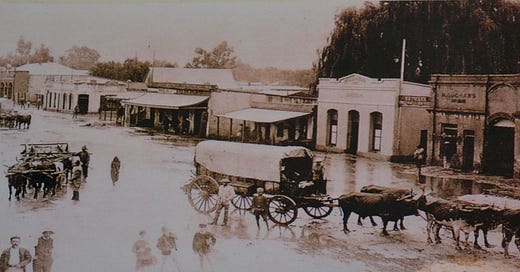On the morning of June 5, 1893, Gandhi set off to find Albert Weir [A.W.] Baker, a local attorney in Pretoria, Transvaal. Their mutual client, Dada Abdulla, was a wealthy Muslim trader who was suing a former business partner there. Gandhi and Abdulla were from the same home town back in India, and their shared native tongue would improve communication with the legal team.
At A.W. Baker’s law office, Gandhi was pleased to discover that, unlike many other whites in Durban, he was “free from colour prejudice.” An enthusiastic Christian, Baker set his sights on converting Gandhi to what he considered the only true religion. He grilled Gandhi on his beliefs. “I am a Hindu by birth,” Gandhi responded, “I intend to make a careful study of my own religion and… of other religions as well.”
Baker was pleased by the candor and religious tolerance of the young man. Thirteen years older, the second generation South African would become something of a minor mentor to Gandhi. Not just a lawyer, Baker was also a magazine publisher and a driven lay preacher who gave sermons at a church that he had built. His messages of Christianity among the Africans earned him converts, although Gandhi would never be counted among those ranks. He did absorb many of Baker’s other disciplines. In the coming years, Gandhi would use profits from his law office to start the first of several newspapers designed to uplift, encourage, and inspire his countrymen, Indian Opinion.
For now, Baker told Gandhi, there wouldn’t be much legal work for him. A higher priority was finding more permanent lodgings that would be cheaper than the Johnston Family Hotel. Dada Abdulla had cautioned Gandhi against boarding with any local Indians; they would certainly have some ties with the defendant in the lawsuit. “A fearful amount of colour prejudice” made it difficult to find a white family, but Baker knew “a poor woman,” a baker’s wife, who might rent him a room, and they set off to meet her. After private consultation with Baker, she agreed to accept Gandhi as a boarder.
According to biographer Ramchandra Guha, Baker “vigorously promoted temperance.” This makes it somewhat surprising that when Gandhi spoke about the household in 1927, he revealed that alcohol had a grip on domestic life there. Gandhi described the husband as a “drunkard” who ruled over his wife as “lord and master,” yet was subservient in turn to his drinking addiction. She struggled to make ends meet while he spent his paycheck on booze, and was “always in dread” of his nightly return. In describing the anguish of the baker’s wife, Gandhi doesn’t relate if physical abuse occurred in the household. It certainly seems possible that it did, and that the young man was aware of it.
Gandhi’s year in Pretoria was a formative one that advanced his beliefs in religious tolerance and temperance.
Who would you define as a “minor mentor” in your life?



